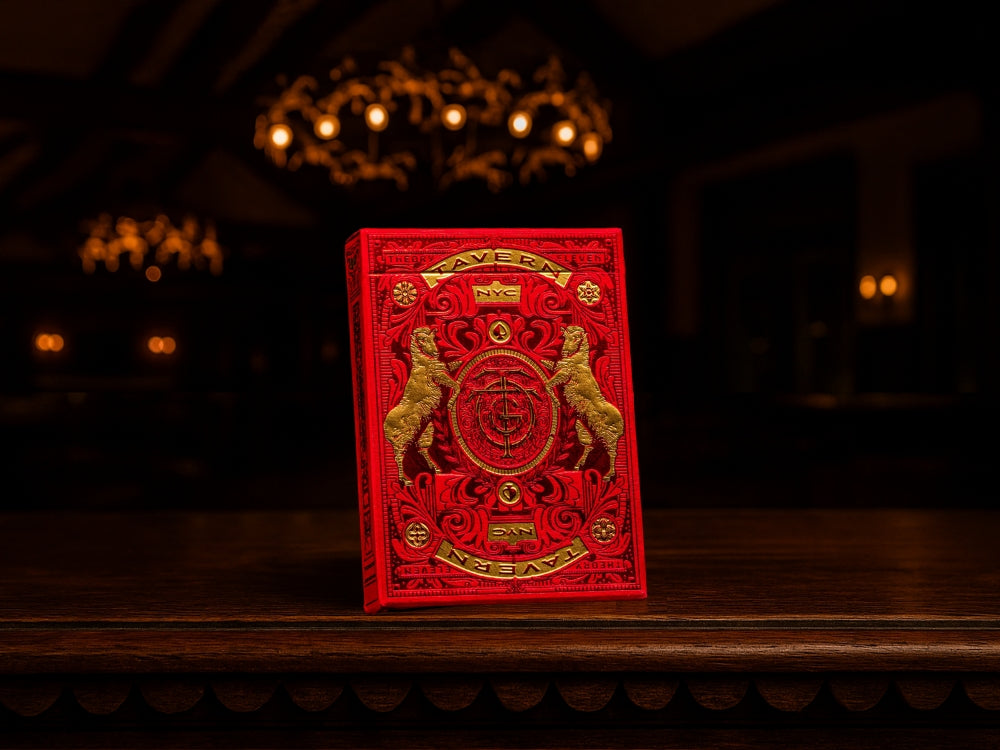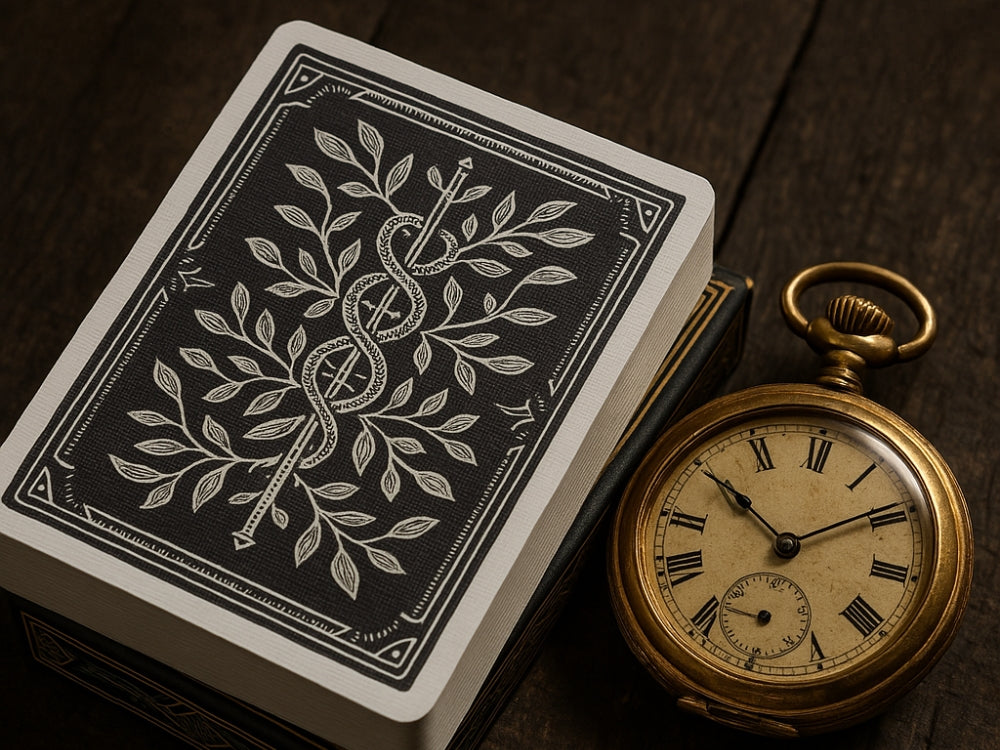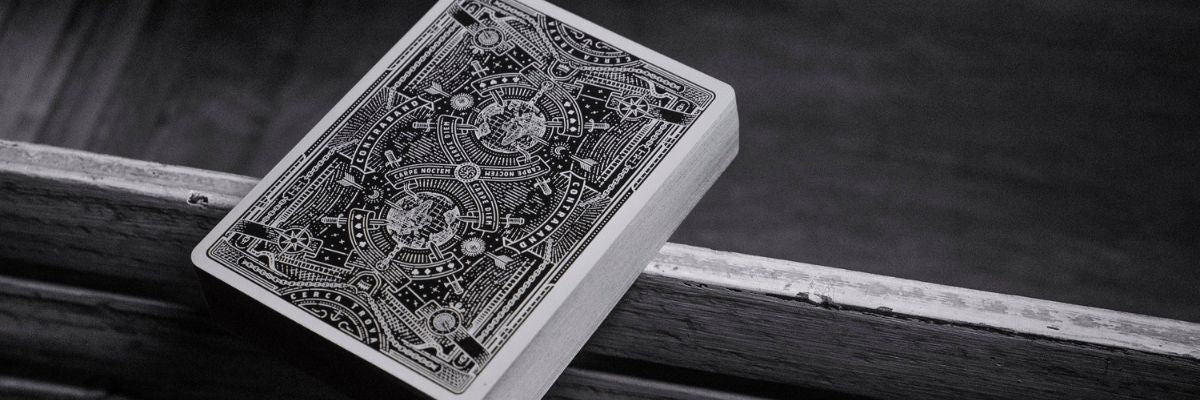You’d think a deck of cards is just… a deck of cards. Neatly stacked rectangles, four suits, a few royal faces, and maybe the odd Joker smirking at you from the pile. But tucked behind those crisp edges is a whole world of superstition – some charming, some a bit crazy, and some you might find yourself believing in the next time luck turns against you.
The Curse of Scotland Playing Card
The nine of diamonds – better known (ominously) as the Curse of Scotland – is one of the few cards in the deck with a nickname, and not a flattering one. It’s long been considered one of the most unlucky playing cards you can be dealt.
No one knows for certain why this came about which, of course, makes it more intriguing. Some say it was the card used to sign orders before the bloody Battle of Culloden by the traitorous Duke of Cumberland. Others link it to the Massacre of Glencoe in 1692. There’s even a theory that it comes from the game Pope Joan, where the nine of diamonds plays a villainous role as the “Pope”.
The truth is, no one can quite agree on its origin, and that mystery is half the reason it still gives people pause at the table. Whether or not you believe in omens, the nine of diamonds has earned its place in card-playing folklore.
But it’s not just the nine of diamonds. Practically every card in the deck has picked up some superstition over the centuries. That’s the thing about cards; they’ve been part of our lives for so long, it’s no surprise people have started seeing meaning in the mayhem.
The history of playing cards goes way back, possibly all the way to 9th-century China, before winding its way through Persia, Europe, and eventually into our kitchen drawers and gloveboxes. They’ve been linked to fortune-telling, banned by religious leaders, taxed by monarchs, and embraced by families (mine included) as a way to spend a lazy Sunday afternoon.
Rituals, Rules, and Red Cards on the Floor
Ever dropped a card mid-game and quickly checked what colour it was? In Ireland, if it’s red, you’re in luck. Black? Maybe sit that round out. This kind of thing might sound silly until it happens to you. Suddenly, you're eyeing that red three of hearts on the floor like it just handed you a winning lottery ticket.
Players have all sorts of strange habits. Burning cards indoors? That’s bad luck. Cutting someone else’s deck? That depends on who you ask – some say it brings bad fortune, others say it takes the luck with you. One of my favourites is the superstition that singing during a game means you’ll lose. Not entirely sure if that’s a belief or just a polite way of saying someone’s off-key.
In Ireland (and honestly, I love how rich the folklore is), there are even traditions like turning your coat inside out to break a losing streak, or leaving an empty seat and dealing a hand for a deceased relative at the table on New Year’s Eve. There's something really human about it all. Little rituals that bring people together and give meaning to the randomness.
Lucky Hands, Devil’s Deals, and the Cards You’ll Never Forget
In poker, everyone has a “lucky hand” – even if it’s just one that came through for you that one time at uni with a packet of crisps on the line. Pocket Aces, sure. Suited connectors like Jack-Ten, why not. But just as quickly, hands can earn a reputation for being cursed.
The most famous? The Dead Man’s Hand, two black Aces and two black Eights, supposedly held by Wild Bill Hickok when he was shot. Throw in three sevens (sometimes called the Devil’s Hand), or Ace-King (“Big Slick”), and you've got a handful of unlucky playing cards that plenty of players avoid like the plague.
The Cards That Carry Weight
Some cards have a presence. The Ace of Spades is the obvious one. Steeped in meaning, from its ornate tax stamp days in 17th-century England to its eerie use in the Vietnam War as a symbol of death. In some cultures, spotting the Ace of Spades lying face up on the ground is basically a death omen.
Then there’s the Queen of Spades, also known as Black Maria. In the game of Hearts, she’s an instant 13-point penalty. In Russian stories, she’s a witch. In fortune-telling, she’s a powerful woman who could destroy you or inspire you, depending on her mood.
And let’s not forget the Joker card. It’s a bit of an oddball. A relatively modern addition to the deck, not tied to the traditional suits, and often removed entirely by players who think it brings bad luck. But in cartomancy (and in Tarot as “The Fool”), it can represent new beginnings, risk, or wild unpredictability. A bit like ordering takeaway from a place you’ve never tried before.
It’s a Game, But It’s Never Just a Game
Maybe all these superstitions, from the curse of the Scotland playing card to blowing on dice, from lucky charms to dodging the Joker, aren’t really about changing the outcome. Maybe they’re just ways of making sense of the chaos. Of turning a shuffle and a deal into something that feels a bit more meaningful.
And that’s part of the draw, isn’t it? Playing cards might be rooted in maths and probabilities, but they’ve always had a bit of magic to them. Just look at the theory11 playing cards, especially the Harry Potter playing cards – beautifully illustrated, packed with hidden details, and somehow just a bit more enchanting than your average deck. Whether it’s Hogwarts or Hearts, there’s something about holding a bit of magic in your hands that makes the game feel different.
I’ve got decks I keep not just because they feel amazing to handle, but because they feel lucky. A set of premium playing cards isn’t just for playing; it becomes part of the ritual. The way the cards slip through your hands, the way the light catches the gold foil on a luxury playing cards tuck box — it adds to the theatre of it all.
If you’re going to believe in unlucky playing cards, it makes sense to believe in lucky ones too. And if you're going to play, you may as well do it with cards that feel like they have stories in them, whether it’s a deck of marvel playing cards, or just a set that reminds you of games around the kitchen table.
Maybe that’s what makes playing cards so irresistible. Every shuffle is a chance. Every deal hides a secret. And every card turned could be an omen – for luck, for loss, or for the hand you were meant to play.




